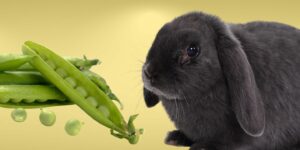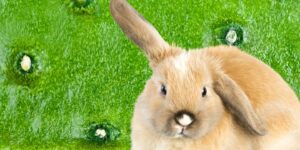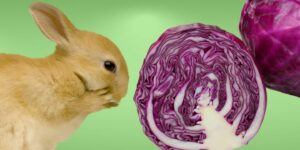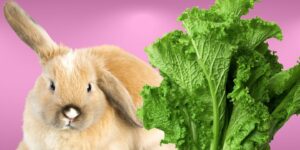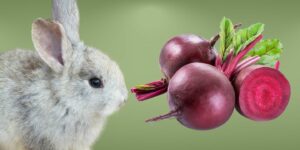Yes, rabbits can eat lettuce, but it should only be given to them in moderation. Lettuce is not a nutritionally complete food for rabbits and should only make up a small part of their diet. In this article, we will debunk common myths about rabbits and lettuce, explore the nutritional value of lettuce for rabbits, discuss the various types of lettuce, and suggest alternatives and proper serving methods.
Nutritional Value of Lettuce for Rabbits
Macronutrients: protein, fat, and carbohydrates
Lettuce is low in protein, fat, and carbohydrates. While it can provide some dietary fiber, it should not be considered a primary source of nutrition for rabbits.
Micronutrients: vitamins and minerals
Lettuce contains some vitamins and minerals, such as vitamin C, vitamin K, and potassium. However, compared to other vegetables, the micronutrient content in lettuce is relatively low.
Water content in lettuce
Lettuce has a high water content, providing hydration for rabbits but also increasing the risk of digestive issues if fed in excessive amounts.
Comparison to other vegetables
In terms of nutritional value, lettuce is not the best choice compared to other vegetables like kale, spinach, and broccoli, which offer more essential nutrients to support your rabbit's health.
Types of Lettuce and Their Suitability for Rabbits
Iceberg lettuce: avoid due to high water content and low nutrition
Iceberg lettuce should be avoided as it has minimal nutritional value and a high water content, which can cause diarrhea in rabbits.
Romaine lettuce: a better option with more nutrients
Romaine lettuce is a more nutritious option for rabbits, containing more vitamins and minerals than iceberg lettuce. It can be fed in moderation as part of a balanced diet.
Butterhead lettuce: another acceptable choice
Butterhead lettuce, such as Boston or Bibb lettuce, is another suitable option for rabbits. It has a higher nutritional value than iceberg lettuce, and can be fed in small amounts.
Green and red leaf lettuce: suitable for rabbits
Green and red leaf lettuces are also appropriate for rabbits. They have a better nutritional profile compared to iceberg lettuce and can be fed in moderation.
Tips on choosing the best lettuce for rabbits
When choosing lettuce for your rabbit, opt for those with more nutrients, such as romaine or green and red leaf lettuces, and avoid iceberg lettuce due to its high water content and low nutritional value.
Risks and Side Effects of Feeding Lettuce to Rabbits
Diarrhea and digestive issues due to high water content
Feeding your rabbit too much lettuce, especially iceberg lettuce, can cause diarrhea and digestive problems due to its high water content.
Nutritional imbalances from overfeeding lettuce
Overfeeding lettuce can lead to nutritional imbalances, as it is not a complete source of nutrients for rabbits. It's crucial to provide a well-rounded diet for your rabbit, including hay, vegetables, and high-quality pellet food.
Pesticide and chemical residue concerns
Make sure to wash lettuce thoroughly before feeding it to your rabbit, as it may contain pesticide or chemical residues that can be harmful to your pet.
Alternatives to Lettuce for a Rabbit's Diet
Leafy greens: kale, spinach, and collard greens
These leafy greens offer a higher nutritional value than lettuce and can be fed in moderation to provide a varied diet for your rabbit.
Vegetables: carrots, broccoli, and bell peppers
These vegetables provide essential nutrients for rabbits and can be fed in small amounts alongside leafy greens and hay.
Herbs: parsley, dill, and cilantro
Adding herbs to your rabbit's diet can provide additional nutrients and flavor to their meals.
Importance of variety in a rabbit's diet
To ensure your rabbit receives proper nutrition, it's essential to provide a varied diet with a mix of hay, vegetables, and high-quality pellet food.
Preparing and Serving Lettuce to Rabbits
Washing and inspecting lettuce for cleanliness
Always wash lettuce thoroughly and inspect it for signs of spoilage or contamination before feeding it to your rabbit.
Chopping or tearing lettuce into manageable pieces
Chop or tear lettuce into small, easy-to-chew pieces to make it easier for your rabbit to eat.
Mixing lettuce with other vegetables and herbs
Combine lettuce with other vegetables and herbs to provide a balanced and varied diet for your rabbit.
Monitoring your rabbit's reaction to lettuce
Keep an eye on your rabbit to ensure they do not experience any adverse reactions, such as diarrhea or digestive discomfort, after eating lettuce.
Frequently Asked Questions about Rabbits and Lettuce
How much lettuce should I feed my rabbit?
Feed your rabbit no more than a handful of lettuce per day alongside other vegetables, hay, and high-quality pellet food.
Can baby rabbits eat lettuce?
Consult your veterinarian before introducing lettuce to a baby rabbit's diet, as their nutritional needs may differ from adult rabbits.
Can rabbits have too much lettuce?
Yes, overfeeding lettuce can cause nutritional imbalances and digestive issues, so it should be fed in moderation.
What should I do if my rabbit has diarrhea after eating lettuce?
Remove lettuce from your rabbit's diet and consult your veterinarian for further guidance.
Conclusion
In conclusion, rabbits can eat lettuce, but it should only be given to them in moderation. Lettuce is a low-nutrition food that should only make up a small part of your rabbit's diet. By feeding your rabbit a balanced diet of hay, fresh vegetables, and a small amount of pellet food, you can help them stay healthy and happy.



